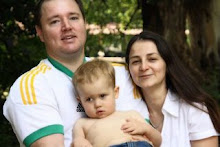Wanted to share this with you all, thanks Loren for sending on from the blog of MOM - NOT OTHERWISE SPECIFIED
Saturday, March 13, 2010
A hair-dryer kid in a toaster-brained world
Okay, so: the presentation.First, I should tell you that we orchestrated it with the stealth of CIA operatives. We didn't want Bud to see me in the building, because we knew that my presence would be difficult for him. (Mom does not belong in school. Mom should only be here when she has come to take me home.) We all synchronized our watches, and as lunchtime approached, Mrs. Nee walked Bud to the lunchroom, where he was meeting another staff member, and Ms. Walker readied the classroom, while a student, Noelle, helped me slip in the side door and up the back staircase.While we waited for a few students to return to the class with their hot lunches, Ms. Walker let me know that they'd told the children a little bit about my blog, read them a few excerpts, and let them know that people all over the world read about their classroom. The kids were delighted to know that they had fans, and even more delighted by the idea that they'd been given pseudonyms when I wrote about them. It seems they'd had some fun trying to figure out who was who.Then, the children returned with their lunches and settled at their desks, which had been arranged in a circle. I sat down to join them, and it was time to begin.I started by thanking them for inviting me to their class. "I hope you know," I said, "that you are really, really important people to Bud. He doesn't always show friendship the way other people do, but believe me - you are important to him. He talks about you all the time. He tells me all about his buddies. And he loves having buddies."They grinned their response."I also want to thank you for asking such great questions." I held up their index cards. "Your questions were fantastic, and they tell me that you really pay attention to Bud."Dan raised his hand. "I wasn't here the day they wrote cards," he said. "But I do have some questions.""That's great, " I told him. "How about if I answer the questions that other people have asked first, and then if I haven't answered your questions, you can ask me more about them."Dan agreed, and I turned to the rest of the class. "You can all ask more questions. Sometimes when something seems different, people can get nervous about asking questions, but I want you to know that I want you to ask questions. It's the best way to learn about things you don't understand."My intro was over and it was time to get into my answers to the questions they'd written. I'd prepared ten pages of notes. I wanted to help the kids understand Bud's differences, but I didn't want to present him as "other," as though he were an alien living among them, as though there were something wrong with him, so I'd developed some analogies - some things that I hoped would help them relate Bud's experience to their own.The first one felt the riskiest. It was my make-or-break analogy - the one on which the rest of the presentation hinged. If it didn't resonate with them - or, worse, if it seemed lame - I was afraid I'd lose them. I knew that one ill-placed snarky comment from one of the kids could make the whole thing unravel.So I took a breath, and I started talking."The first question that lots and lots of you asked is: What is autism?"Autism is something that people are born with – you either have autism or you don’t have it. You can’t catch it."Having autism means that your brain is put together differently. Your brain still works perfectly well. It just does things differently from other people’s brains."Let’s think about the brain as a machine. You know that your brain controls everything you do. You use your brain to think about things and to make your body do things. Your brain also controls things that you don’t even think about. You don’t have to remember to breathe, because your brain does it automatically for you. You don’t have to remember to blink, because your brain does it. So, sometimes you USE your brain to do things and sometimes your brain just does things because that’s what it’s wired to do."The same thing is true in autism. Bud uses his brain for everything, too. But because there are differences in the way his brain is connected, there are differences in the way his brain reacts to things."Now, we all know that your brain is a machine that's made of tissue and neurons and nerve cells. But let’s pretend it was a more simple machine. Let’s pretend your brain wasn't made of tissue and neurons and nerve cells, but instead, it was made of metal and plastic and electrical wires. And let's pretend that when you put that metal and plastic and electrical wire together, it turned into a toaster."Here, the class laughed - the good kind of laughter. I carried on. They were with me."And let’s pretend that MOST of us had toaster brains. Some of us might make white toast and some wheat toast or rye toast, and some of us might make light toast and some of us dark toast. Some of us might only toast bagels, and sometimes we might even burn the toast, but for the most part, all of our brains would be able to do the same thing: make toast."Now, think about the pretend world that we have just created. In our world, MOST people have toaster brains. So, when we make the rules for our world and decide how we want to spend our time, what do you think we’ll decide is the MOST important thing a person can do?"Nora raised her hand. "Always try hard and do our very best?""Yes!" I said. "And WHEN we do our very best, we will be doing a great job making...""Toast!" they responded in unison."Yes! Because we have brains that are really GOOD at making toast - so we will want to have a world where it's REALLY important and REALLY valuable to make toast. Right?"Heads nodded around the room."Now let’s pretend that Bud’s brain is ALSO made of metal and plastic and electrical wires, just like our brains, except that when HIS metal and plastic and electrical wires get put together, they turn into a totally different kind of machine. Instead of being a TOASTER, Bud's metal and plastic and electrical wires turn into a HAIR DRYER."I swear, I heard gasps."Now, there’s nothing WRONG with a hair dryer, right? Hair dryers are great! There are some things that hair dryers are really good for. There are some things that a hair dryer can do even BETTER than a toaster. But it is REALLY, REALLY hard to make toast with a hair dryer."They laughed again, and nodded, and totally, completely got it."So, in our pretend world, even though Bud has a perfectly wonderful hair dryer brain, it’s going to be hard for him, because we toaster-brained people have decided that the most important thing that people do in our world is make toast. And Bud probably can make toast with his hair dryer, right? But he is going to have to work a lot harder to make toast with his hair-dryer brain than we will with our toaster brains. It will probably take him a lot longer to make his toast. And no matter how hard he works, his hair-dryer toast will probably always look different from our toaster toast."The room filled with murmurs of understanding."But, on the other hand - think about THIS! When we toaster-brain people have wet hair? We are REALLY going to hope that Bud and his hair-dryer brain are around."Nathan piped in. "Because we could get ZAPPED if we tried to use our toasters!""Exactly," I continued. "And the same thing is true in the real world with our real brains, that are made of tissue and neurons and grey matter and, uh...""And important stuff," offered Travis."Yeah, and important stuff," I said. "Because for most of us, when that important stuff gets put together, we have a certain type of brain. And we have created a society that says the most important things are the things that most of our brains are really good at - things like:"Talking and communicating with people;"Making friends and spending time with people;"Doing lots of different kinds of things, having lots of different kinds of interests, and trying new things."Because our brains are really GOOD at those things, we try to spend most of our time doing them. But those are all things that, because of his autism, Bud’s brain has a really hard time doing."Language is difficult for him and he doesn't talk the same way as other people."Being social and knowing how to interact with people is difficult."Changing his routine and trying new things is difficult."The classroom resonated with affirmation. Bud's classmates knew exactly what I was talking about. They knew, without me explaining any further, what kinds of behaviors I was talking about. I could see the understanding in their faces."But, remember how there were some things that the hair-dryer brains could do better than the toaster brains? There are ALSO things that Bud’s brain is really GOOD at doing. There are things that HIS brain can do better than a lot of our brains can do."I bet you can guess what some of those things are. Can you?"Hands flew up all over the room, and without my prompting, they recreated the list I had written in the notes in front of me."He's really great on the computer. He's better at it than LOTS of people.""He has great hearing.""He can remember lots of lots of things.""He can remember all the words to TV shows.""And he can remember the words to songs.""He is very musical.""He's a great speller, too," I added. "Once he learns a word, he usually remembers how to spell it.""If I had a brain like that," said Nathan. "I'd read the whole dictionary and learn all the words.""That would be a great thing to do," I said. "And it reminds me that Bud is also a really good reader."Molly raised her hand. "And he has a great sense of humor, too.""He does have a great sense of humor," I said. "And that's one of the ways that his brain is a lot like other people's. What are some of the other ways that Bud is just like everyone else?"Again, the hands flew up."He can see just like everyone else.""He looks just like everyone else.""He's human.""Yes! He's human - which means that he has all the same feelings that everyone else does. And he loves the people in his life. And he likes to play and have fun. He likes to laugh, he likes to swim, he likes to eat pizza. In lots of ways, Bud is just a regular kid."I looked around the room at the smiling faces of Bud's classmates - his friends, with their toaster-brains firing."But a lot of your questions were about some of the ways that Bud is different from you and about the things that are harder for him than they are for a lot of other toaster-brained people. So, let’s talk about some of those questions."
Subscribe to:
Post Comments (Atom)




.jpg)






















1 comment:
Loved this!!!!! So important to help the world see things Deqlans way than to always try make him see it there way!!!!
Post a Comment